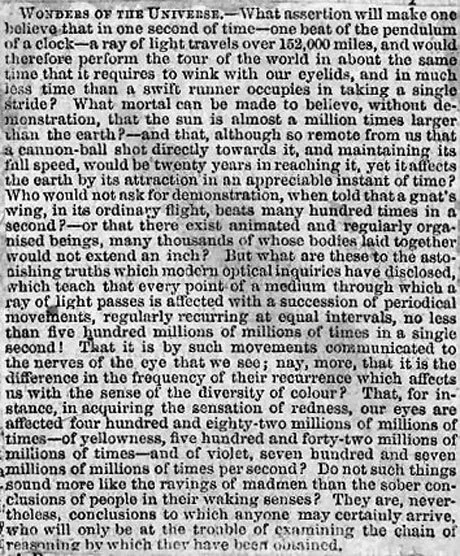Wonders of the universe
What assertion will make one believe that in one second of time – one beat of the pendulum of a clock – a ray of light travels over 152,000 miles, and would therefore perform the tour of the would in about the same time it requires to wink with our eyelids, and in much less time than a swift runner occupies in taking a single stride? What mortal can be made be made to believe, without demonstration, that the sun is almost a million times larger than the earth? – and that, although so remote from us that a cannon-ball shot directly towards it, and maintaining its full speed, would be twenty years in reaching it, yet it affects the earth by its attraction in an appreciable instant of time? Who would not ask for demonstration, when told that a gnat’s wing, in its ordinary flight, beats many hundred of times in a second? – or that there exist animated and regularly organised being, many thousands of whose bodies laid together would not extend an inch? But what are these to the astonishing truths which modern optical inquiries have disclosed, which teach that every point of a medium through which a ray of light passes is affected with a succession of periodical movements, regularly recurring at equal intervals, no less than five hundred millions of millions of times in a single second! That it is by such movements communicated to the nerves of the eye that we see; nay, more, that it is the difference in the frequency of their recurrence which affects us with the sense of the diversity of colour? That, for instance, in acquiring the sensation of redness, our eyes are affected four hundred and eighty-two millions of millions of times – of yellowness, five hundred and forty-two millions of millions of times – and of violet, seven hundred and seven millions of millions of times per second? Do not such things sound more like the ravings of madmen than the sober conclusions of people in their waking senses? They are, nevertheless, conclusion to which anyone may certainly arrive, who will only be at the trouble of examining the chain of reasoning by which they have been obtained.
